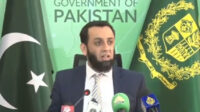Written by Major (r) Haroon Rasheed.
Defense and strategic analyst specializing in South Asian military dynamics and technology
The recent Israeli strike on Qatar has shaken the foundations of security perceptions in the Gulf. For decades, Qatar, Saudi Arabia, the UAE, and Oman relied heavily on Washington’s umbrella of protection, believing their close alignment with the United States was a sufficient deterrent against regional threats. Yet, Israel’s bold action against Qatar – despite Doha’s longstanding partnership with the U.S. – has created a wave of disillusionment across the Middle East.
Stop immigration situation, use military if needed: Trump to British PM
4 Indian-sponsored terrorists killed in Khuzdar: ISPR
PM leaves for London after concluding visit to KSA
For more such Opinions & Blogs, click here.
Doubts Over U.S. Reliability
For Gulf monarchies, the attack was not only a direct challenge to Qatar’s sovereignty but also a symbolic moment: if America’s closest Gulf partner could be struck so openly, what guarantees remain for others? Saudi Arabia, the UAE, Oman, and even Qatar itself are now recalibrating their strategies, recognizing that U.S. assurances may no longer provide the shield they once expected.
Saudi Arabia’s Pivot Toward Pakistan
In this shifting landscape, Pakistan has emerged as a surprising but natural security partner. Saudi Arabia’s unprecedented protocol for the visiting Pakistani Prime Minister was not merely ceremonial; it signaled Riyadh’s acknowledgment of Pakistan’s growing strategic relevance. The signing of a new strategic agreement between the two nations marks a watershed moment, expanding cooperation beyond economic and religious ties into defense and security coordination.
Pakistan brings to the table one of the largest and most battle-hardened militaries in the Muslim world, nuclear deterrence capability, and decades of operational experience. Unlike the U.S., Pakistan’s commitment to Gulf security is tied not only to political interests but also to historical, cultural, and religious bonds.
Cordial talks with Saudi Crown Prince covered wide range of issues: PM
President in Urumqi to boost Pak-China regional ties
Saudi Arabia’s landmarks light up with Saudi, Pakistani flags to celebrate defence pact
Ripple Effect Across the Gulf
Saudi Arabia’s move has already inspired parallel discussions between Pakistan and other Gulf states, with reports suggesting that both the UAE and Qatar are negotiating similar security pacts with Islamabad. Should these agreements materialize, they would represent a dramatic reconfiguration of the regional security architecture, with Pakistan positioned as a guarantor against external threats – particularly from Israel.
This shift could also alter the balance of power in the wider Middle East. Pakistan’s entry as a direct security stakeholder would challenge Israel’s ability to exert unchecked pressure in the Gulf. Moreover, it would give smaller states like Oman and Qatar an alternative source of protection, reducing their reliance on an increasingly unpredictable Washington.
A New Geostrategic Equation
The implications of these developments are profound:
Strengthened Muslim Bloc: A network of strategic defense agreements led by Pakistan could evolve into a formidable bloc capable of deterring aggression from Israel or other adversaries.
Reduced Dependence on the West: Gulf monarchies may gradually pivot away from total dependence on U.S. security guarantees, balancing their alliances with a more regionally rooted partner.
Revival of Pan-Islamic Security Vision: For years, the idea of collective Muslim defense structures has remained more of a slogan than a reality. Today, however, Pakistan’s willingness and capability to safeguard Gulf allies could breathe life into that vision.
Challenge for Israel: Facing not just individual Gulf states but a united bloc backed by Pakistan’s military power, Israel would need to reconsider the costs of future regional aggression.
Pakistan, IAEA sign 5th CPF for 2026-2031
Pakistan urges Afghanistan to fulfill counterterrorism obligations
Sikh community urges Modi govt to lift ban on yatrees traveling to Pakistan
Pakistan’s Rising Responsibility
With opportunity, however, comes responsibility. Pakistan’s new role will demand delicate diplomacy, balancing Gulf commitments with its already complex relations in South Asia and beyond. Ensuring that these security agreements do not escalate into open confrontations, but instead serve as deterrence mechanisms, will be Islamabad’s greatest challenge.
Conclusion
The aftermath of Israel’s strike on Qatar has set into motion a geostrategic realignment. Disillusioned with the U.S., Gulf states are now turning to Pakistan as a trusted protector. As Saudi Arabia leads the way with a historic agreement, and others prepare to follow, Pakistan is stepping into a role few could have imagined a decade ago: the central guardian of Gulf security against a common adversary.
This transformation not only reshapes Middle Eastern geopolitics but also marks the rise of Pakistan as a decisive actor on the global stage.
For more such Opinions & Blogs, click here.
Water flow in rivers across Punjab normal: PDMA
Pakistani sound engineer Taurees Habib wins Grammy Award
India’s propaganda tactics exposed amid global scrutiny of rights abuses
Mushaal Mullick Pays Heartfelt Tribute to Late Kashmiri Leader Professor Ghani Bhat
Mirwaiz, others barred from attending Prof Bhat’s funeral
Australian Pilot Dies After Plane Carrying 180 kg Cocaine Crashes In Brazil
Major (R) Haroon Rasheed is a defense and strategic analyst specializing in South Asian military dynamics, deterrence strategy, and defense modernization. He is a member of the Research and Evaluation Cell for Advancing Basic Amenities and Development (REC).
Stay tuned to Baaghi TV for more. Download our app for the latest news, updates & interesting content!






